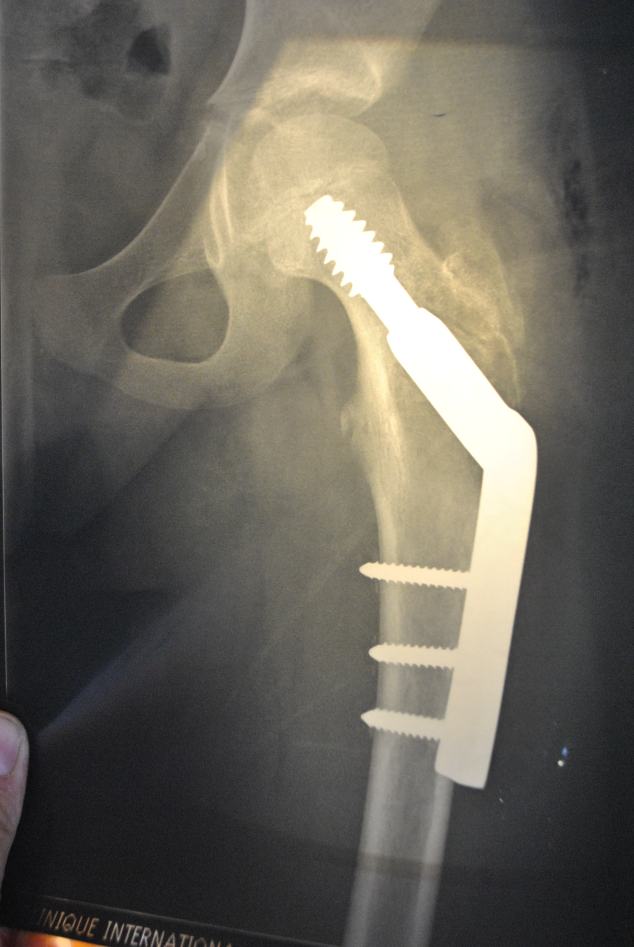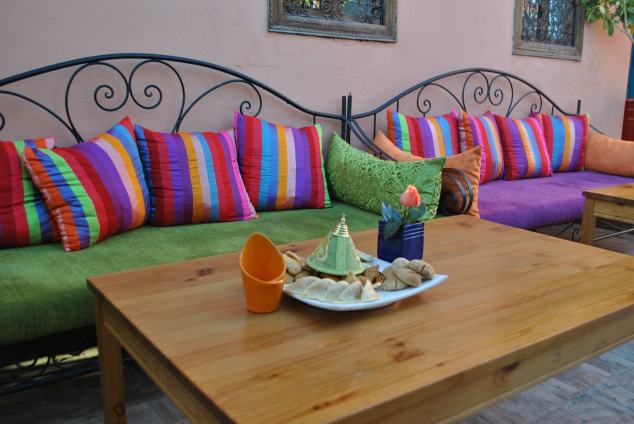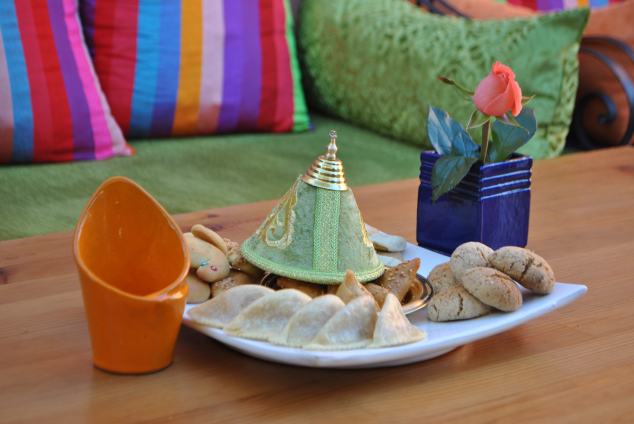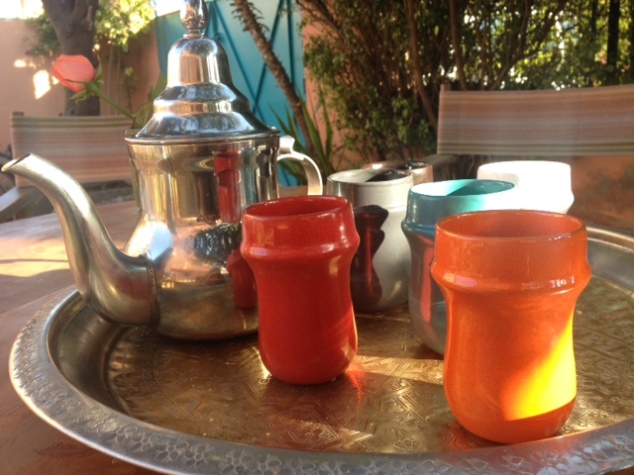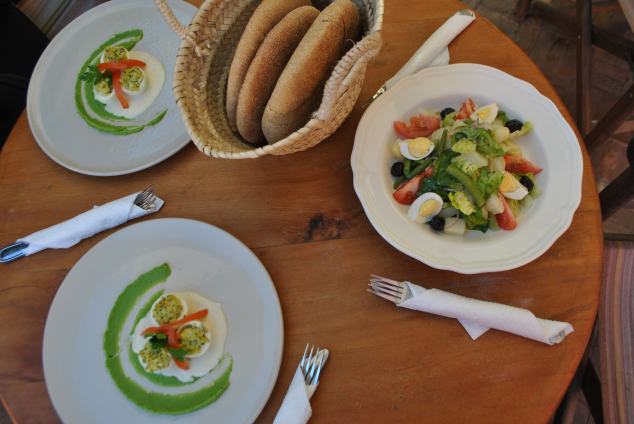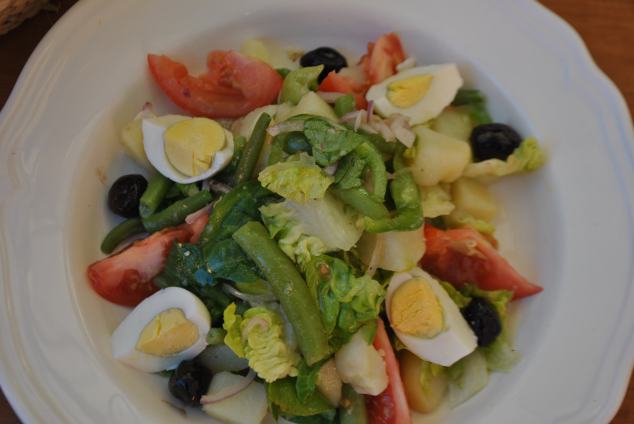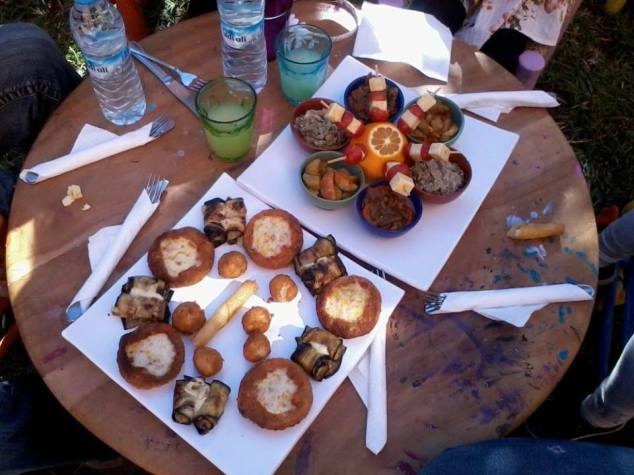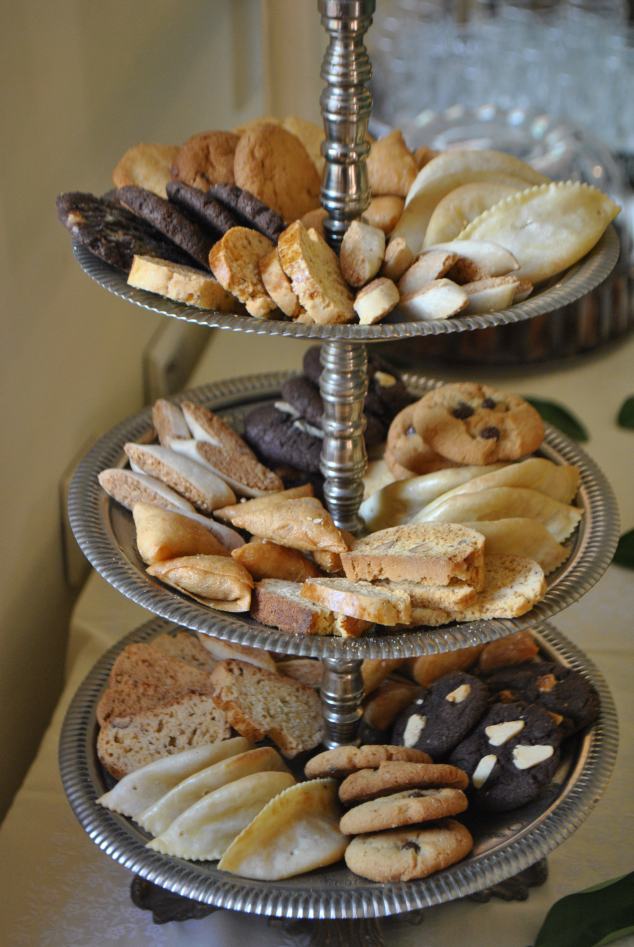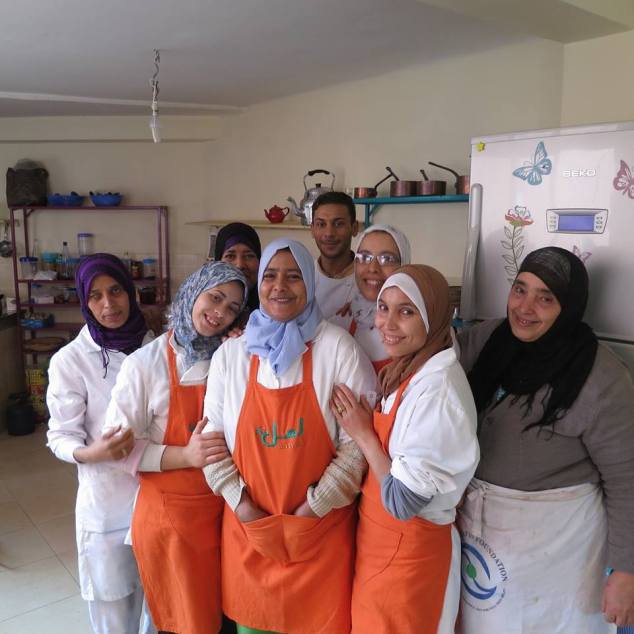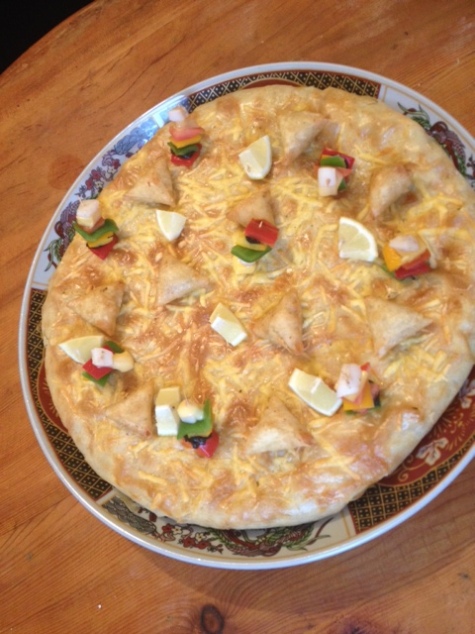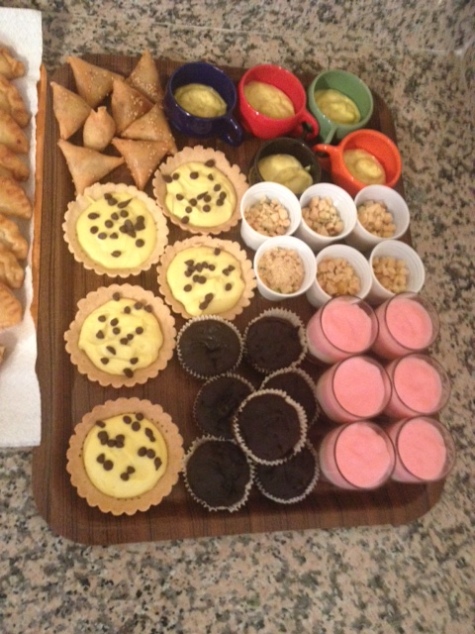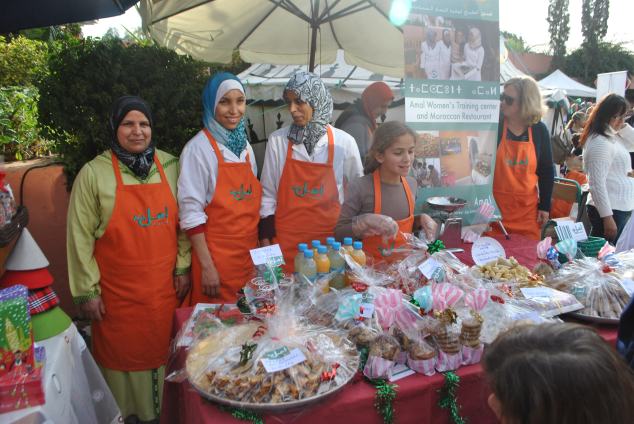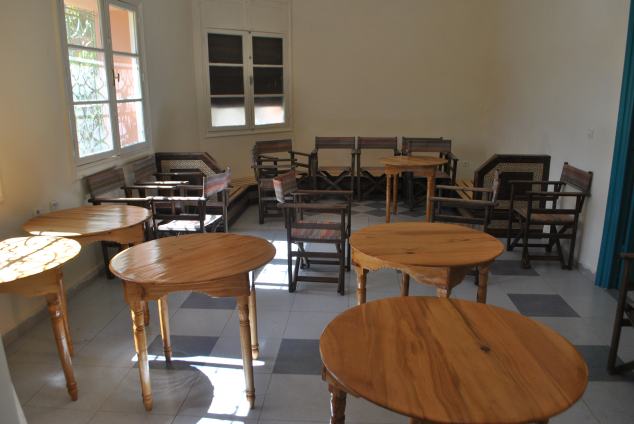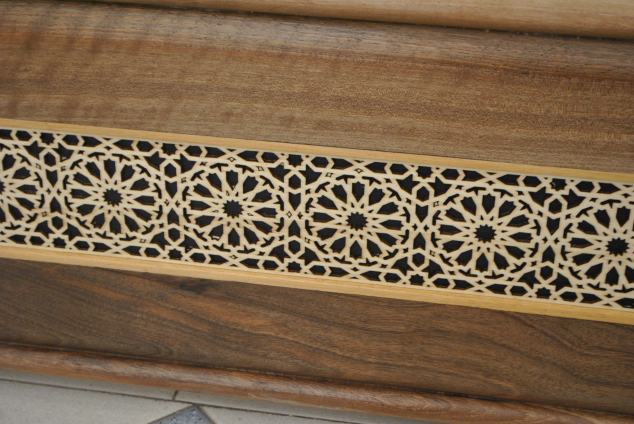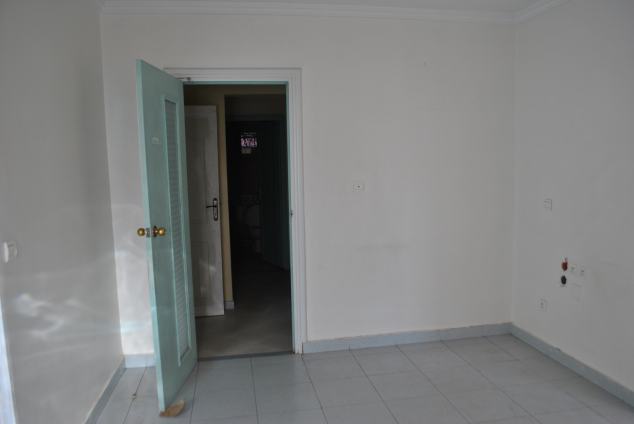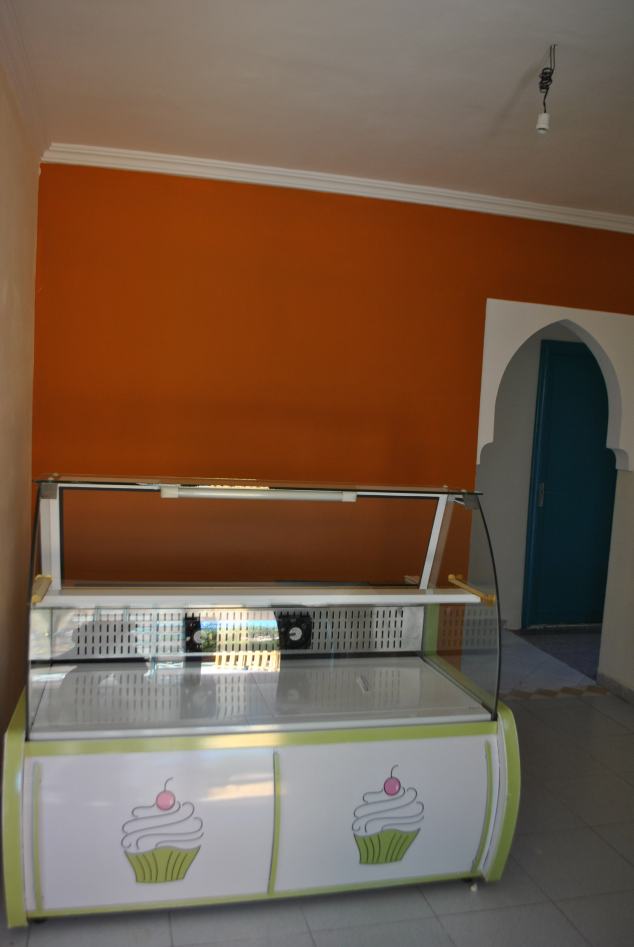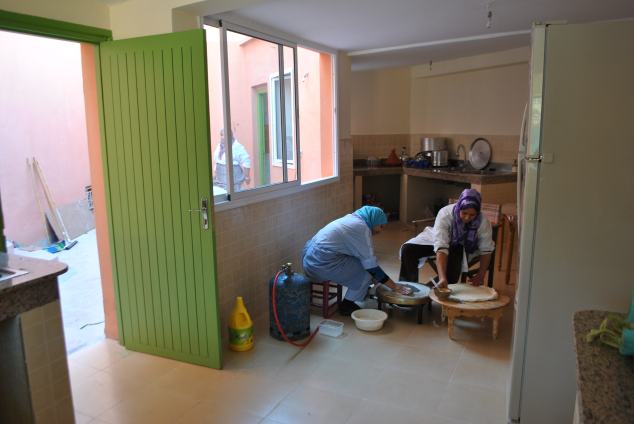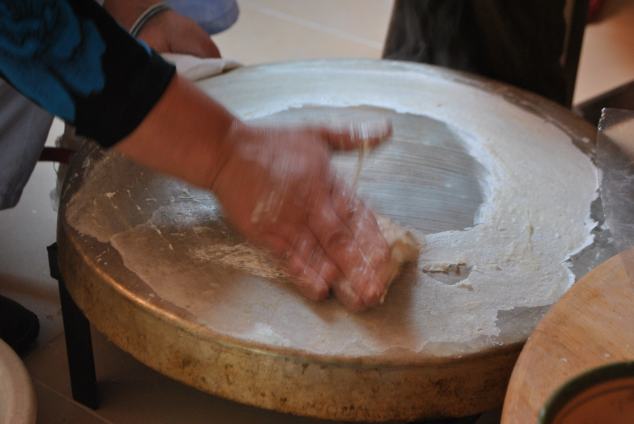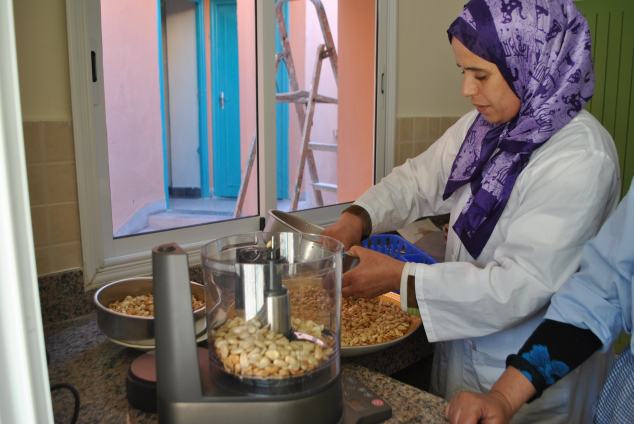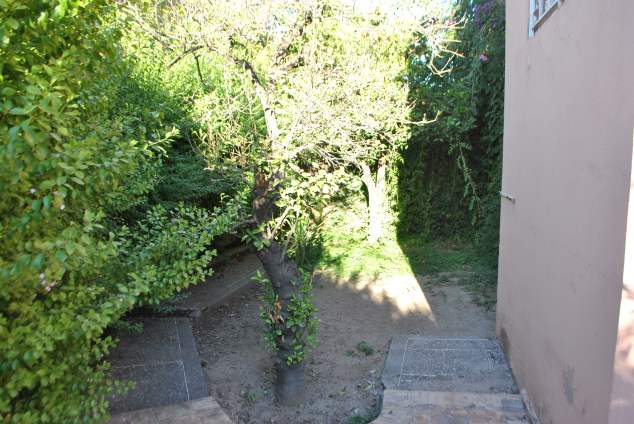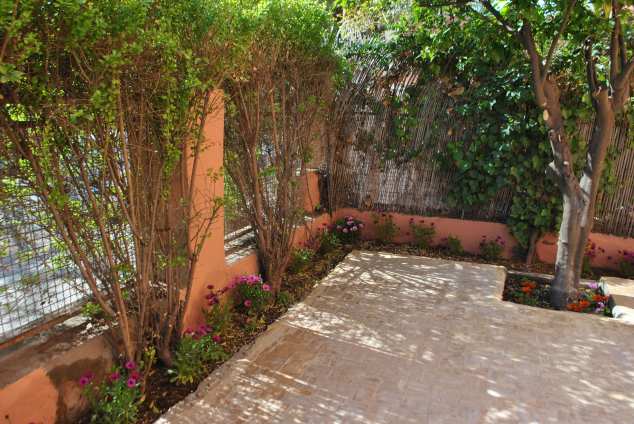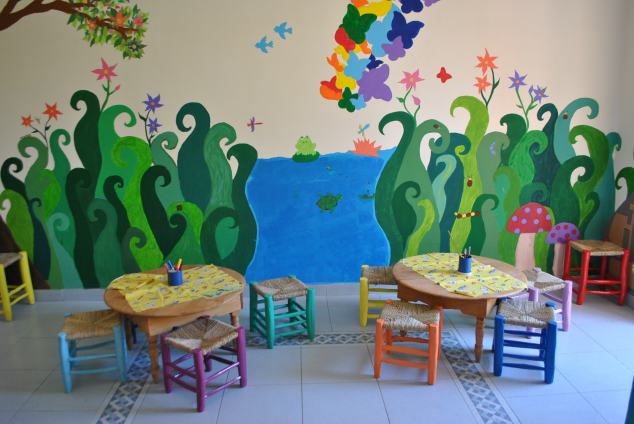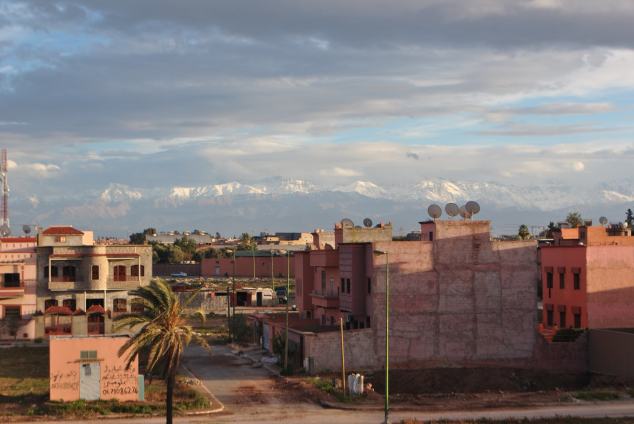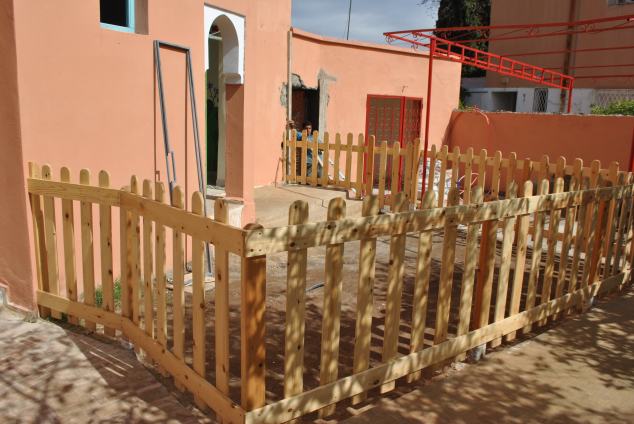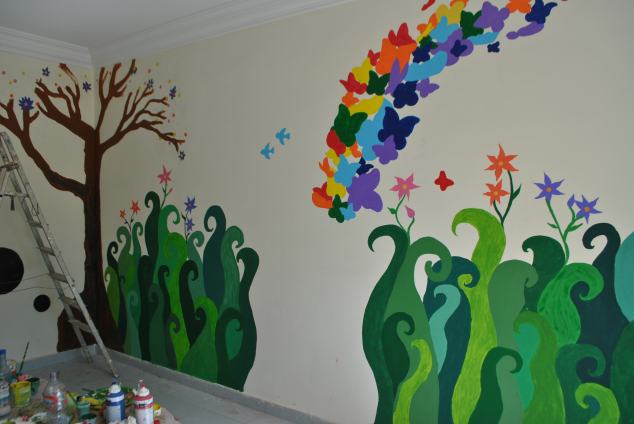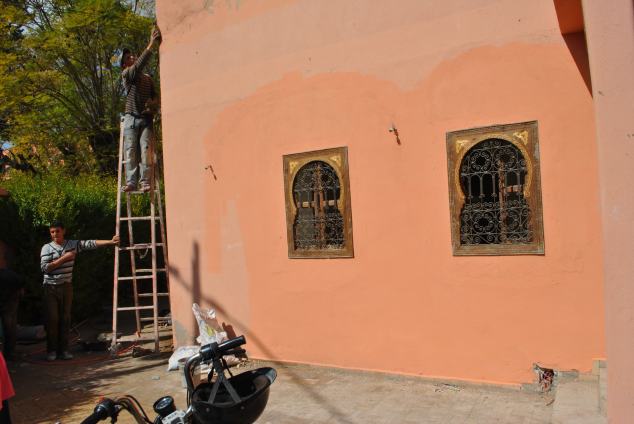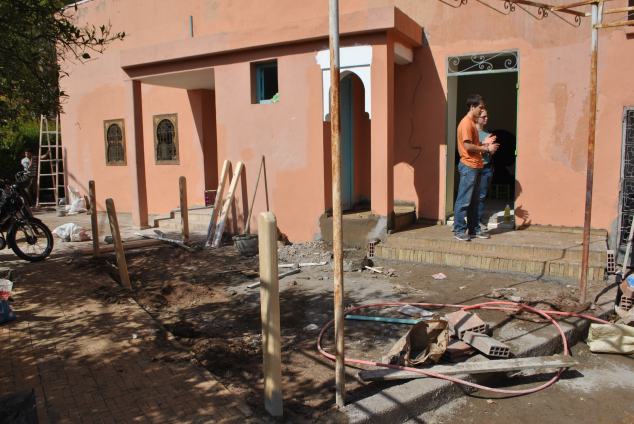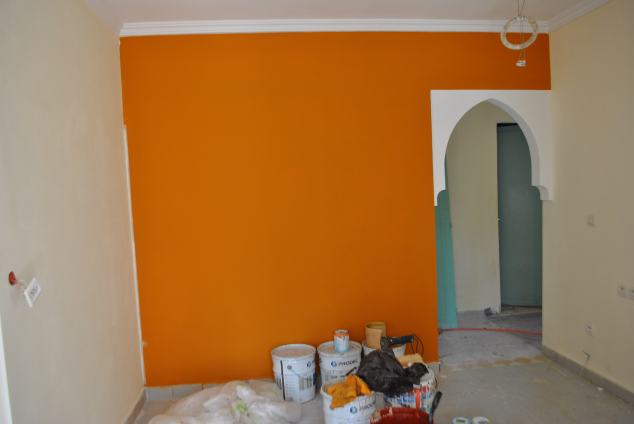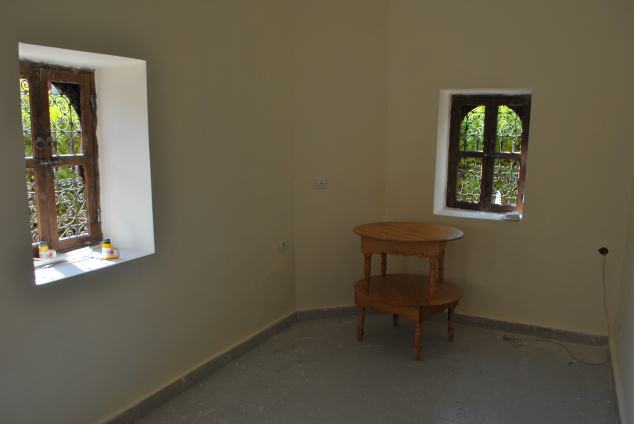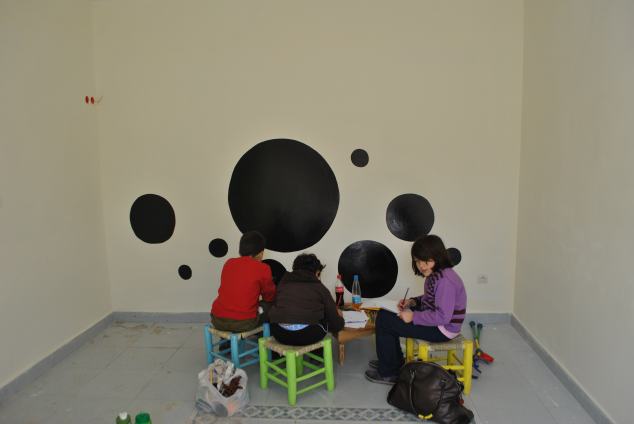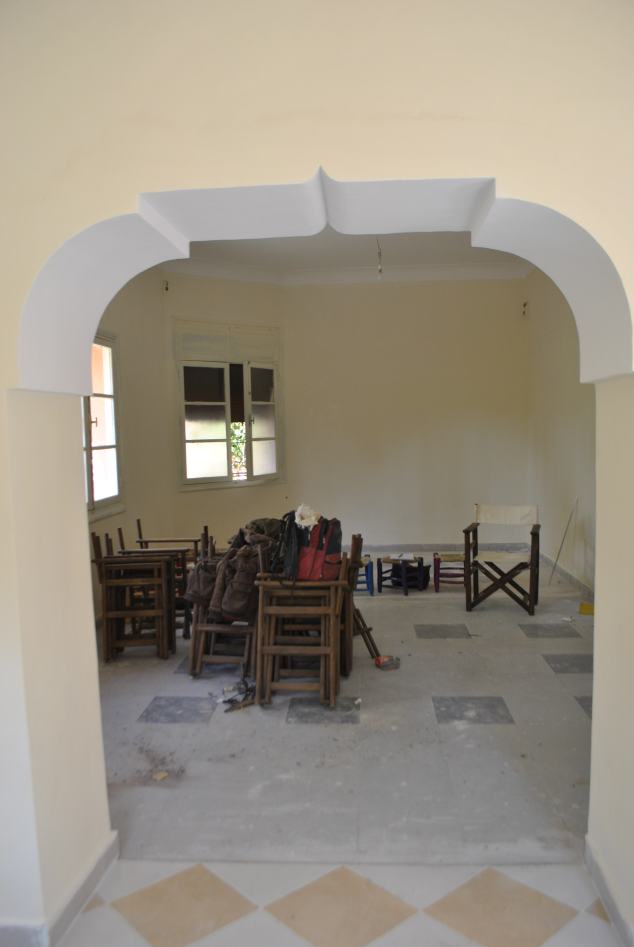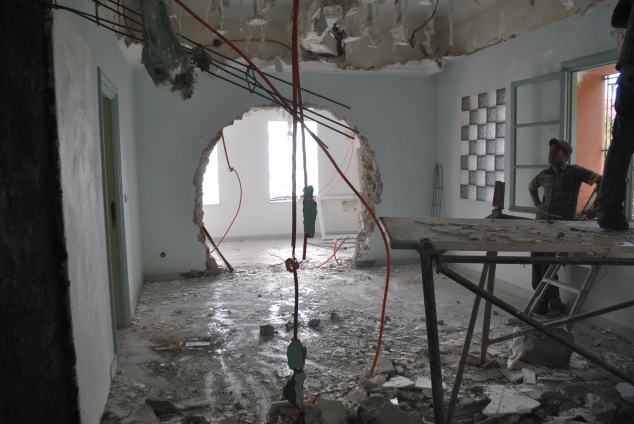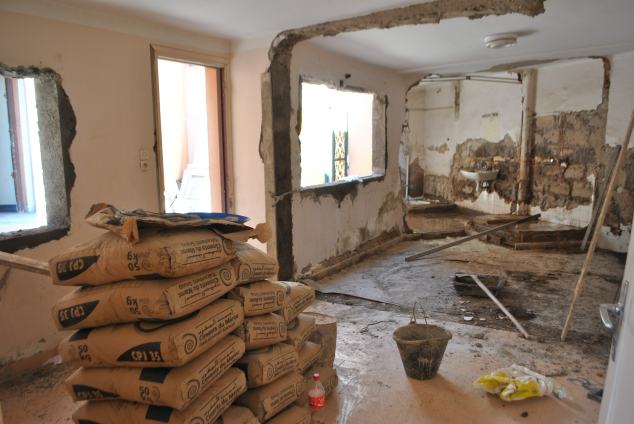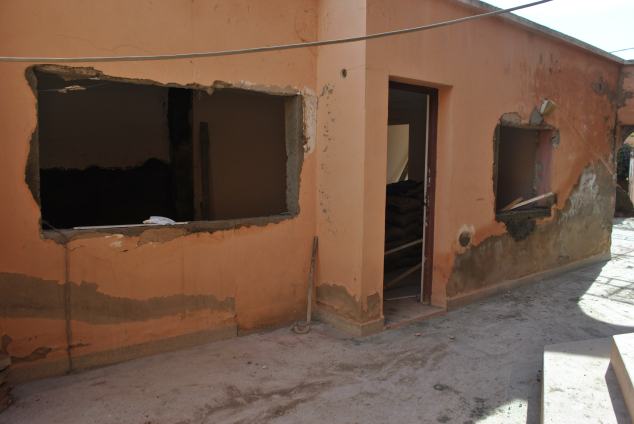If you have a million hours to kill and love to read about other people’s surgeries, then I invite you to read this post that turned into a mini-book. It’s about my daughter’s surgery to treat a unicameral bone cyst in her femur. Or just scroll down to the end and see what all the fuss is about. Wish I were better at real-time blogging.
So Karima was scheduled to have her first medical intervention the following day. We were all nervous and excited, it would be the first time anyone of the five of us in our nuclear family would “go under”, although Karima’s grandmothers have had LOTS of surgeries. She was excited about everything, the clinic, having a swanky hospital bed with flat screen tv all to herself. The clinic itself looks like what people in the 70’s might have imagined the future would look like, everything is white, glass and rounded. It’s a brand new, state-of-the-art clinic with the prestigious sounding name Clinique Internationale de Marrakech. I assume with the word Internationale they are referring to their clientele, a mix of Moroccans and Europeans. Morocco is just getting into the whole “medical tourism” scene in a big way. This place has all the latest equipment, I myself got an MRI there a while back, a few friends have had surgeries or delivered babies there.
When it was time Karima was wheeled away, we weren’t allowed anywhere near the OR. It was our first experience of watching her being taken away, all in a white, like a little angelic being. We felt we wanted to be there with her til the last minute, because she’d be surrounded by a team of medical personnel. But that’s not how people in Morocco think about it, here connections are made quickly and everyone is either “auntie” or “uncle”. The doctors and nurses would not treat her much differently than they would any child, including their own.
Hamza and I went for a little drive, prayed in the Kasbah mosque, and had some lemonade at a trendy little café overlooking the Kasbah square. When we returned, after about an hour, Karima was already awake and enjoying some tea and toast. We were all thrilled that she was not in pain at this point, things had gone well. She told us what it felt like to be put to sleep (like blinking and when you open your eyes it’s already over). The doctor didn’t come see us, I suppose within his range of procedures, this one was so minimal as to not require much discussion or explanation.
Karima started her life on crutches. As expected, her friends and teachers made a big deal out of her. They brought her lunch in class so she wouldn’t have to hobble downstairs to the cafeteria. They made sure she was comfortable and helped prop her leg up on some jackets. I said to Karima, “the good thing about being on crutches is that you won’t get detention”. Her school is big on detention.
She adapted to her crutches very quickly, I was amazed at how seamless the transition was, and also saddened in a way at how fast disability had made a home with us. But she wasn’t beat by it mentally or emotionally, in fact navigating life with a handicap just another challenge that she wanted to excel at. This was in the beginning. Before her body started to get very sore. By three weeks into it everything ached, her wrists, elbows, and most of all her “good leg”. Her good leg got really strong but tightened up, while her hurt leg got weak and skinny. One night she had to get up really fast and couldn’t find her crutches. She hobbled on her hurt leg, and the next day she was in so much pain that we had to go get her from school by 9 a.m. We went to the doctor and he re-took the x-ray. We were hoping there would be some change, even the slightest, although three weeks isn’t really enough to make a difference. Normally we were going to take the x-ray at 6 weeks. It was still disappointing to see the x-ray with no change. The bone cyst was just a dark mass of nothing. At this point the doctor re-iterated to Karima that she shouldn’t put any weight on the hurt leg. This was also the first time he talked about surgery. He said that if she experienced great pain we’d need to go the surgery route. This was a scary thing to hear, especially since all this was discussed in Karima’s presence.
I realized that until this point I’d been trusting that the cortisone treatment would work. On the side, I’d been doing research online, going to forums and message boards to see what other people had done. There were several promising minimally invasive procedures, besides the cortisone injection. One was to pack the bone cyst with either bone graft or synthetic bone material. I brought these options up with the doctor, but he said that the cortisone injections were the standard approach, the most likely to give results, and that beyond that there was little hope except surgery. Hamza and I were frustrated that there wasn’t any energy here in Marrakesh around the idea of new or alternative therapies.
We moved house during all this. To a new neighborhood with lots of outside space. The boys immediately took to riding their bikes every minute they weren’t in school. The youngest, Yousef, learned to ride a two-wheeler a few days after we moved in. I had this idea that riding a stationary bike would be good for Karima, it would give her hurt leg some gentle, much-needed movement. Then she said “what about riding a real bike?” And we both said “nah”. What if she needed to stop real quick and jarred her hurt leg on the ground? Still the idea kept coming back and Karima said, “Let me just try it”. We had never wanted to hold her back or keep her on bed rest. We’d always tried to let her have as much freedom as possible while on crutches. She was so tied to those crutches, I didn’t want her to start identifying with them. They weren’t a part of her body. The bike idea seemed worth a try, so she got on very carefully, propped her hurt leg up on the pedal, and started to pedal with her good leg. It worked really well. She circled around the empty lot that is in front of our house and she just laughed to feel so free. It was beautiful to see her move so fluidly after about 5 weeks on crutches. Plus it felt really great on her hurt leg, it got gently bent in that way that felt so good to her.
The bad news is, Karima had a fall. One of the neighbor boys was walking his rather feisty dog, and the dog lunged at Karima while she was on the bike. She tried to make a u-turn real quick and her bike tires slipped in the dirt. She fell directly on her left side, the side with the bone cyst. After that she started to have a lot of intermittent pain, it would come on real strong, like a contraction during labor, then pass. We were majorly set back, she and I could no longer do the simple physical therapy moves we’d been doing, like bending her hurt leg at the hip.
The doctor ordered another x-ray because he suspected a hairline fracture or fissure. Nothing showed up, but we saw once more that the cyst was the same size, in fact if anything it seemed larger. The doctor said that if the pain kept up we’d have no alternative but surgery. We started scrambling to find a specialized clinic abroad, we looked at Spain and France. Our hope was to find an orthopedic pediatric specialized team. We had complete faith in the doctor in Morocco, he was widely known and had performed many successful surgeries on some of our friends and acquaintances. Still our hope was to find someplace that performed some of the less invasive therapies we’d read about, the bone marrow transplant, or packing the cyst with bone graft, inserting cannulated screws in the cyst to drain it continuously…anything to avoid a painful surgery that might have long-lasting repercussions. Our good friend in Spain was married to a doctor so she was an obvious choice to ask for help. Sure enough she and her husband started to research the question for us.
In the end though, the choice was taken out of our hands. On Saturday the 12th, Karima hurt her leg again. I suppose this was inevitable. She was starting to get tired of the crutches and sometimes stumbled because she was being careless. She’d almost slipped a few times. On that Saturday, we had a few kids over and although she had said she didn’t want to play with them and she was going to stay in her room, in the end she couldn’t help it and went outside to be part of the action. Somehow it happened that one of the kids stepped on her hurt foot, and as she tried to pull it away, she felt something snap. More intense pain, she went to her room and got in bed. It was worse now than before. I thought it might pass if she stayed in bed and didn’t move it.
But by night time, the pain had only gotten worse. Now she was crying non-stop and none of our meds worked, even paracetamol with codeine that we kept around for those special (painful) occasions. Nothing could cut through the pain. It was an awful feeling for me, to watch her shrieking in pain, and I had to think quickly in a situation I’d never been in before. I texted my husband to come home quick, and then called the doctor and explained the situation. It was obvious by now that Karima needed emergency pain relief. Karima was saying “I want the surgery right now, I don’t care, I’ve been patient all this time, too patient! That’s it! Make them fix me mama!”
We rushed her to the clinic in the middle of the night, calling some good friends to come spend the night with the boys, Amin and Yousef. Karima was still in a state of agony when we got there, but somehow after about an hour, she relaxed a lot. The resident on duty was another student of my husband’s, and once Karima had relaxed, they were discussing how it makes more sense for medical students to write their theses in English rather than French, since all the reference material is in English. My husband teaches English and so people often want to have these types of conversations with him. We also found out why the x-ray appeared to show that Karima had a fractured hip bone, totally unrelated to the bone cyst problem. We’d seen these x-rays and they left us really perplexed (and googling “children hip x-ray”). Well it’s because there is a layer of cartilage in the middle of the bone, that’s where the bone grows from, and on x-rays the cartilage shows up blank. It looks exactly like a fracture, but it’s not.
Karima seemed to relax even without pain meds. She and I went to her room, by this point exhausted because it was 2 in the morning. But she couldn’t sleep, the pain would come on in waves, so we had to call the nurse in, who gave her the first (but not the last) very diluted morphine shot. I didn’t know that morphine really burns when it’s being injected. But it sure knocked that girl out. I was surprised that such a swanky clinic was “out of blankets”, luckily we’d grabbed two on our way out. They were going to charge for each person that stayed the night with her, and there was only a thin couch to sleep on, so we decided that I would stay with her that first night. Finally by 2-3 in the morning we were both able to pass out.
The next morning was pretty mellow, Karima was excited to be in the clinic and have it be such a big deal. The surgery was scheduled for the afternoon so she was instructed to eat a light breakfast and then nothing after that. Her dad brought her just about all of her favorite breakfast things including Moroccan donuts, French cheese bread, msemn fried bread with eggs, chocolate milk and a Crunch bar. Although at this point she didn’t have much appetite (maybe the morphine). We all gladly helped her out though. That morning she was still “enjoying” the “thrill” of being in the hospital. She asked her dad to get a wheelchair and wheel her around the place. When I look back on that morning and her innocent excitement I’m so sad. Nothing could have given her (or us for that matter) any inkling as to what was about to happen to her, I mean going through the door of surgery and coming out on the other side. To prove how clueless we were for about the post-op, we actually had this plan to re-unite our family (the five of us) and celebrate over happy meals in the evening (her special request). That was her big wish,” I want a happy meal waiting for me”. Note that we don’t eat at McDonalds ever, except in circumstances of major duress.
The day dragged on and finally by 3 pm they came for Karima. We gave her big hugs and she was wheeled off. We didn’t even know which type of surgery she would have. The doctor had told us there were two options: the first, and least invasive, was having 2 titanium pins inserted into the bone (intramedulary) near the knee and those would go from the knee to the hip (this is the option we were hoping for obviously). The second option was to have a metal plate inserted directly at the site of the cyst, fixed in with screws. This was going to be the more invasive of the two. The doctor said that after Karima was under anesthesia, he would study the bone under a machine called fluoroscopy which is like a big x-ray. If he found it was too fragile he’d go with the second option. So he told us it would all take some time, because he couldn’t actually decide which surgery to go with until she was under. The prep work would take about 1.5 hours even before the surgery began .
We sat and did some prayers, prayers for mercy and healing. There’s a way in which being in a hospital room is a lot like being in a retreat. There’s not much to do except be very present with what is. It’s a very focused and refined space. I think I actually tried to sleep at that point, I was in that soldier mode where a mere 20 min of complete and deep relaxation can keep you going another 8 hours. Some people came to visit, thinking that Karima was already out of surgery. A few co-workers of Hamza’s. Around 6 pm I started to get anxious and restless, I went down to ask at the front desk if they’d heard anything. They said that there was usually no communication from inside the OR, so they didn’t know any more than I did. After that I went down about every 10 or 15 mins, just to feel like I was doing something, each time they said, we’ll let you know as soon as we hear something. I had awful moments thinking of all the bad things I’d heard about people not getting up from anesthesia. Because overall, we weren’t “worried sick”, up to this point we hadn’t felt like Karima had anything life-threatening or debilitating, so although it was a major shock to even find ourselves there, we didn’t have a feeling of desperation. But of course, with the surgery taking so long, the mind wanders. Finally around 7 they said that the nurses had left the OR. The first sign of life from in there.
Then all of a sudden the doctor was in the room with us, dressed in his everyday clothes, which was a little disorienting. It’s like he was ready to go home and we didn’t even know what was going on. He’s a very calm guy, for someone who deals with so much responsibility, he never rushes or gets worked up. I learned a lot from seeing how he is, he just deals with what is in front of him and he gives it all his attention and intelligence. We didn’t even know what questions to ask. He said the operation went well. I had the wits about me to ask which of the two surgeries he’d done, and it was the second option, the metal plate. Masha Allah, not the news we were hoping for. I don’t know why I was still in the mindset that it was going to be the first options (titanium pins). Later Hamza said he knew it was the second because it took so long. At this point, everything was so new and constantly changing that we were beyond reacting to each individual development.
He took us down to see Karima, she was still in the OR. He had us put on some disposable gowns. We went in, it’s an intense space, there were people in their cots with curtains pulled across, in various states. Lots of machines and beeping. Very high tech and state of the art. We saw Karima in her bed, asleep. Her face pale and somewhat swollen. She opened her eyes slowly, saw us, and a tear rolled down her temple. She just said “it hurrrrts” and she slipped back into unconsciousness. That is when it hit me, what she’d gone through, how big this all was. She opened her eyes again, and again that look of pain came across her face. I wished she wouldn’t wake up, and sleep through the worst of it. We tried to think of something positive to say, so we said “Salma is here”. Salma is a really good friend of hers, and Karima had asked that she visit. It was clear to me at that point that Karima was in no shape to see anyone that night. I remember touching Karima’s face and she relaxed and went to sleep. It was like seeing a newborn. But she kept waking up, each time she was in pain, and I think too at this point, the shock of her new state was settling in. Before she had thought that when she woke up from surgery she’d just be all better. And I had similar delusions too, I didn’t expect to be set back this far. I stayed with her, while Hamza went out to tell people that she wouldn’t be seeing any visitors that evening. Salma and her family, and a few others visitors had kindly shown up and I was so grateful that people cared enough to do that.
They wheeled Karima up to her room and transferred her to her bed. She was so groggy and she was suffering. The nurses settled her in and then left, and Karima promptly threw up. I was mad at the nurses for not anticipating this and leaving her something to throw up in. I cleaned her up, called them to change the sheets, and I found a bowl in the bathroom that was meant to collect water from a dripping faucet. I put this near her. Then she went to sleep, and I remember thinking, “great, she’ll probably just sleep through the night and through the worst of it”. I settled down on the couch but didn’t go to sleep, I think I was checking internet on my phone or something. Then Karima threw up again, I helped her, rinsed out the bowl and brought it back. Poor thing she was exhausted and the throwing up was so violent. She proceeded to throw up every half hour or hour, all night long. Every time she drank a little water, she’d throw it up. We tried some 7up too because it “has electrolytes” and I wanted her to have fluid in any form possible. The nurses came in a few times, but mostly we managed on our own. The general attitude in Morocco is that throwing up after surgery is a really good thing because it purges the body of the anesthetic, so they actually saw Karima’s all-night barfing binge as something great. She got a lot of encouragement from the nurses about that. I got sleep in two shifts that night 12-2 and 5-8 or so. Karima was exhausted and only wanted to sleep, but her body’s reactions wouldn’t allow her to. She dozed on and off. I wonder if they didn’t give her a dose of anesthesia that was too much for her body weight, or if she is just particularly sensitive to it. I remember getting up each time to help her, and each time I was more groggy and confused, til I couldn’t talk, I would just go through the motions and collapse again. It was like having a newborn, except with a newborn you don’t know what they need, and with Karima, she could tell me exactly how much her body hurt, how dizzy and nauseous she felt, and there still wasn’t a whole lot I could do except exert myself to the maximum to relieve her suffering. It didn’t make me long for a newborn, truth be told.
At 8 a.m. I was so ready for Hamza to come and take over. I wanted to go home, have a shower, change, maybe catch some sleep. I figured he’d come in with new energy and shift things. Then he called me and croaked “I’m very sick, I’ve been up all night”. He was having chills and fever and had lost his voice. He was in terrible shape. Because it seems that we have a rule in our life that we never just have ONE thing going on, it’s always two or three major things at once. So. It reminded me so much of my first post-partum days with Karima, where it was something like this: I draw from the well of patience until I feel like I’ve reached the bottom of it, only to find that bottom has gotten much deeper. I draw on that deepest well of patience and strength. I haven’t done this, to this extent, in a long time. Life has not recently tested my physical and mental limits in such a real and raw way.
That morning was horrible. Karima started really freaking out. I don’t know if it’s fair to blame it on the morphine, although I’m sure that added to her delusions. She started sobbing and saying things like “Save me mama, I’m going to die!” “Why would they do this to me, tell them to fix me right now” “It’s TOO MUCH” and also “It’s not fair to do this to a 10-year-old girl”. Pain is a big teacher, and I could see that Karima had gotten a taste of her mortality, at a very young age, and it scared her. A friend said “the good thing about impermanence is that suffering also will pass”. Alhamdulillah that’s true. And from my perspective, the good thing about suffering is that it reminds us of our impermanence. For Karima, the fabric of safety and normalcy was ripped open for a while and all of our efforts combined couldn’t protect her from experiencing that.
My parents came and that helped a lot. At this point I was very bonded with Karima. We hadn’t spent this much time with other continuously, in years. I had that “can’t leave my baby with anyone because no one can take care of her like I can” instinct kicking in. I couldn’t leave that day. We spent a lot of the day like this: Karima would say “My foot, it’s too out”, so I’d pick up the whole leg, adjust it by turning it either in or out, about 1 cm, then I’d lay it down very carefully, prop it up with her favorite red fuzzy blanket. Then I’d gage by her face whether that was bearable or whether I needed to readjust. We did this a lot. It was the least I could do to help make the pain bearable. The nurses started to give her morphine (actually albuphine a close relative of morphine) sub-cutaneously instead of intravenously. Her veins are thin and they’d used up both arms and both hands. She was all bruised and bandaged so they just gave up on the IV. The morphine really burns when it goes in. Then Karima would get really distant and within a half hour she’d pass out. But after an hour she’d wake up and be miserable. The morphine made her really dizzy and nauseous. So it was a balance between managing her surgical pain with morphine, and then managing her nausea with something else. The entire day was spent like this. Karima was too dizzy to watch tv, draw, talk on the phone or play on Gramma’s ipad. Yeah, that’s how bad it was. When people came to see her, they’d make her dizzy. So when they came, I’d let them come and visit for a minute or two, but then if they wanted to talk we’d go out of the room and hang out in the waiting areas.
That evening the doctor came to see Karima. He took out that scary looking drainage tube from her incision. He had Karima turn on her (good) side, which was very challenging for her and she was crying. He took off the bandaid and I got to see the incision for the first time, it was about 5 inches, and long black line. It looked better than I expected, it was swollen or bruised. Karima wouldn’t look at it. Then the doctor made Karima get up, she was very dizzy and weak, she cried that it hurt and that she couldn’t do it. The doctor had her get out of bed, walk around to the other side then get back in there. She was exhausted. I was pretty surprised that she could already do it, because we had spent all day adjusting her leg one cm this way or that way so that she had the least amount of discomfort, and then all of a sudden the doctor comes, turns her on her side, and then has her get up.
Meanwhile, Hamza was really sick, he was suffering from a bad flu. So we had medical drama roaring on two fronts. The next morning, my parents came again pretty early which was just wonderful. They were there for us throughout, taking care of the boys, bringing food and, as usual, my mom would show up with exactly the things we needed, without us having discussed them beforehand. That’s how she is, she just knows. A new calm descended over the room, a new energy took over. Grandpa read to Karima a story he had been reading to her called “Wayside school” and she wasn’t too dizzy to follow. My mom brushed Karima’s hair, gave her a sponge bath, made things tidy in the room. As soon as I felt that Karima was in a good place, I took off, I had a lot to take care of. It was strange to head from there straight to the little stores near our house. I was pretty shaky from not having slept. I grabbed a huge load of groceries…there I was asking the price of carrots, as if it mattered again. And I desperately wanted to tell everyone I met that my daughter had just had surgery, that that was where I was at. But I also desperately wanted to get home, so I kept my story-telling for later. When I got home with the groceries, Hamza was resting, and I gave the supplies to Malika, our housekeeper and savior in times of trouble. It’s a wonderful feeling to know that no matter how crazy things get, she is there to keep the mess in check, and to cook the best Moroccan food in town. I took a much needed shower although at that point we had just moved into our new house and our shower was so funky that in order for the hot water to work you had to turn on some cold water in another tap, then you had to not have the light on because the light and the fan were both connected to the same switch and the fan would suck out all the warm air. Nevertheless, showering and changing clothes was bliss for me. I hadn’t packed anything to go to the hospital and things got so crazy with Hamza being sick that there was never a chance to bring more things.
That afternoon, Karima was ready to leave the hospital. It’s not very restful being in the hospital, there’s always sure to be someone walking in just as you are about to doze off. I’m talking for me as much as for her. She was off of morphine by then, amazingly, so we were no longer tied to the hospital for that. So I called the doctor and asked him to have the clinic release her that day. Hamza was able to come over even though he very weak from the flu. He is really good with the kids and I’m always happy for him to step in.
So now we were waiting for the bill. The girl in accounting told me that if we stayed past 6pm we’d be charged for the night. All of a sudden I was really done with that place and the last thing I wanted was to be charged for another night. I hopped in the car, raced home, got some cash and drove back. I paid the bill and left the insurance forms so that we could file them later and get reimbursed for some of the cost.
We drove home in the night, the same way we came. Since then, Karima has gone through a lot of phases of healing. For the first two weeks she was home, she couldn’t bend her leg, so there always had to be someone on hand to hold her leg and keep it very straight. It was a big milestone when she could finally bend it and get up on her own. Then she slipped and had to put her weight on her bad leg, and after that she couldn’t bend it again. All in all she was in good spirits, but when that happened she broke down, crying and saying that she felt she was never going to get better. It is hard to imagine that one day she’ll really be off crutches…unfortunately, it has become part of lives and something we adapt everything around. Going outside was another big milestone for Karima, as was her first slow walk around the block. Her school is one block away, so I had her walk to it just to reconnect with it and start visualizing going back to school. Last week, Karima started physical therapy, and that’s been transformational. In the first session, it was almost as if Karima didn’t consider her leg a part of her body anymore. She was scared of it and if she needed to move it while she was sitting, she’d move it by picking it up with her hands. She also couldn’t lift her leg more than an inch off the bed. She couldn’t bend her knee hardly at all. Amazingly, by her 4th session, Karima was riding away on a stationary bike, she can bend her knee past 90 degrees, and she can lift her leg up as high as she wants. Every time she comes to physical therapy, a layer of stiffness and disability is lifted off. Having the therapist right there helped her get over this idea that she might hurt her leg or break it if she moves it too much. She’s not afraid of that leg anymore. She needs to rebuild her strength in it to get ready for the next phase which will be 6 weeks of walking with one crutch. After that, insha Allah, she’ll be off crutches completely, just in time for her 11th birthday.
